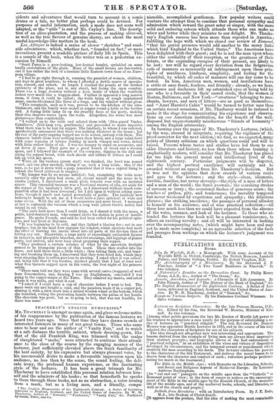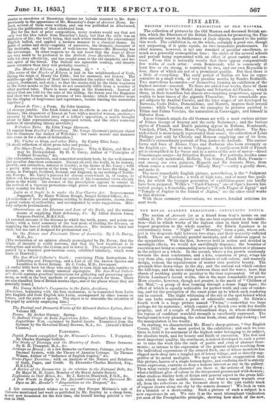PUBLICATIONS RECEIVED.
BOOBS.
,Tohn De WycliP, D.D.: a Monograph. With some Account of the Wycliffe MSS. in Oxford, Cambridge, the British Museum, Lambeth Palace, and Trinity College, Dublin. By Robert Vaughan, D.D. The Autobiography of a Missionary. By the Reverend J. P. Fletcher, Author of "A Two Years' Residence in Nineveh." In two volumes.
A Naturalist's Rambles on the Devonshire Coast. By Philip Henry Gosse, A.L.S., &c., Author of "The Ocean," &c. Annals, Anecdotes, and Legends : a Chronicle of Life Assurance. By John Francis, Author of "The History of the Bank of England," &c. The English Humouriets of the _Eighteenth Century. A Series of Lec- tures, delivered in England, Scotland, and the United States of Ame- rica. By W. M. Thackeray, Author of "Esmond," &c. Essays on Various Subjects. By his Eminence Cardinal Wiseman. In three volumes.
Lectures on Scripture Characters. By the late Duncan Mearns, D.D., &c. Edited by his Son, the Reverend W. Mearns, Minister of Kin- neff. In two volumes.
[Among other public provisions the late Mr. Gordon of Hurtle left power to his trustees to appropriate a sum yearly for the purpose of establishing a se- ries of lectures on " practical religion." The late Reverend Dr. Duncan Meatus was appointed Hurtle Lecturer in 1825, and in the course of his duty selected the characters of Scripture for one of his subjects. The idea though not altogether new was interesting and appropriate. The lessons derived from the example of living men are always more impressive than abstract precepts ; and biography allows of the best enforcement of " practical religion," in an exhibition of the vices and virtues of disposition developed by circumstances, and the temporal reward or punishment which overtook the man according to his deeds. The lecturer confines his persons to the characters of the Old Testament, and deduces the moral lesson to be drawn from the character and conduct of each ; reflection perhaps predomi- nating too much in the treatment.]
The Bible in the Middle Ages; with Remarks on the Libraries, Schools, and Social and Religious Aspects of Mediaeval Europe. By Leicester Ambrose Buckingham.
[An "out and out "panegyric on the middle ages from the " Catholic " or Romanist point of view; in the form of essays or notices on the encourage- ment of the Bible in the middle ages by the Romish Church, of the monastic life of the middle ages, and of the mediteval books, schools, and libraries, as well asef the church and people.]
Ballads from fferodotus : with an Introductory Poem, By S. E. Bode, M.A., late Student of Christchurch. [It appears from the preface, that the idea of making the most remarkable stories or anecdotes of Herodotus themes for ballads occurred to Mr. Bode previously to the appearance of Mr. Macaulay's Lays of Ancient Rome. In- deed, several of them were written, and one was published in Blackwood, before the publication of that celebrated book. But for the fact of prior composition, many readers would say that not only was the idea taken from Macaulay's Lays, but that the style was an imitation of his; the truth being, that each writer imitated the conventional English ballad, and applied a modern manner to a classical theme. In point of action and story—rapidity of narrative, the dramatic character of the incidents, and the interest of well-known themes—Mr. Macaulay has the advantage. In other respects we do not know that the Lays of Rome are very much to be preferred to the Ballads from Herodotus. Mr. Bode tells his story effectively, and has caught some of the old simplicity and he- roic spirit of the Greek. The Ballads are agreeable reading, and deserve more attention than they will probably receive.] The Monks of Kilcrea; a Ballad Poem. By * * *. [The scene of the Monks of ILilcrea is laid in the neighbourhood of Cork, during the reign of Henry the Fifth; but for manners, not history. The middle-age epic ballads of Scott have furnished the author with the idea of subject, treatment, and style ; so that the stories told by the three wayfarers to the three monks at the Abbey do not essentially differ from a number of other poetical tales. There is more design in the framework. Instead of stories that are told for the sake of the telling, the Saxon and the Rapparee find their two foemen in the persons of two monks ; which furnishes scope for the display of forgiveness and repentance, besides binding the narratives together.] Ernest de Pere; a Poem. By John Quinlan. [A strange jumble. The Irish famine and its effects is cue of the author's themes; the elopement of Ernest de Vere with a married woman, another,— excused by the hacknied story of a father's opposition, a match brought about by false representations, suppressed letters, and the other worn-out notions of circulating library novelists.] Wiltshire Tales. By John Yonge Akerman. [A reprint from Bentley's Miscellany. Mr. Yonge Akerman's primary object was to illustrate the dialect of lYiltshire : but rustic morals and manners also come in for a share of delineation.] The Visitor in Grey, and other Tales. By Fanny Eliza Lacy.
[A. small collection of short prose tales and poems.]
The Slave-Trade, Domestic and Foreign : Why it Exists, and How it may be Extinguished. By H. C. Carey, Author of " Principles of Political Economy," &c.
[An exhaustive, cumbrous, and somewhat crotchety book, by the well-known and peculiar American economist. Slavery all over the world, in its history, growth, and extinction, natural or forcible, is the theme of Mr. Carey ; with a pretty wide extension of the term " slavery"—for we have the thing, it seems, in Portugal, Scotland, Ireland, and England, tp say nothing of North- ern Europe. Mr. Carey's panacea for slavery everywhere is, of course, to follow out his prescription, based on certain of his economical views already given to the world : the essence of the prescription appears to consist in the revival of a vigorous protection—high prices and home consumption— every country for itself.]
India as it Ought to be under the New Charter Act. Improvements
Suggested. By Major William Hough, Bengal Retired Officer, &c. [A collection of facts and opinions relating to Indian questions, drawn from a great variety of authorities, and accompanied by some suggestions. Mili- tary subjects predominate.]
Observations on the Diseases and Loss of the Teeth, and the various means of supplying their deficiency, &c. By Alfred Barron Jones, Surgeon-Dentist, M.R.C.S.E.
[A succinct account of the diseases to which the teeth, gums, and palate are liable ; with a brief summary of the best mode of treating the diseases, or supplying the loss of teeth which disease induces. The treatise is brief and clear, but too curt if designed for professional use.]
On the Nature and Proximate Cause of Insanity. By J. G. Davey, M.D., &c.
[The reiteration of an opinion already promulgated by Dr. Davey, that the origin of insanity is really nervous, and that the best treatment is to strengthen and soothe the system, not to lower it. The exposition is accom- panied by a hundred post-mortem cases, exhibited tabularly, which were made at Hanwell.]
The Sea-Weed Collector's Guide : containing Plain Instructions for Collecting and Preserving, and a List of all the known Species and Localities in Great Britain. By J. Cocks, M.D., Devonport. [A useful little book for those who may like to turn their sea-side rambles to account, or who are already i amateur algologists. The Sea-Weed Collect- or's Guide contains practical instructions for gathering and preserving speci- mens as well as the best methods of proceeding to search for them. There are also classified lists of British marine algre, and of the places where they are generally found.]
The Young Scholar's Companion to the Latin Accidence.
[Exercises, beginning with the first declension, to be translated from Latin into English and from English into Latin, accompanied by other lessons on letters, and the parts of speech. The object is to stimulate the attention of the pupil by actively employing him.] The Poetical and Dramatic Works of Sir Edward Bulwer Lytton, Bart. Volume m.
Poems. By Archer Gurney. Spring. C. Sallusti Crispi de Bello Agurthino Liber. Sallust's History of the Jugurthine War, explained by Rudolf Jacobs. Translated from the German by the Reverend Henry Browne, M.A., &c. (Arnold's School Classics.)
PAMPHLETS.
Popish _Frauds exemplified by Dr. Wiseman' s Lectures. I. Purgatory. By Charles Hastings Collette. The Study of Theology and the Ministry of Souls. Three Sermons. By E. H. Plumptre, M.A., &c. Jottings on Money; or a few Remarks on Currency, Coinage, and aNew Decimal System, with the Theory of Annular Coinage. By Thomas Wilson, Author of "Influence of English Capital," &c. State-Paper Taxation; with an Analysis of the Nature and Relations of Gold, Paper, and Credit. By Alexander Charles Macleod, Esq., H.E.LC.S.
A Review of the Income-tax in its relation to the National Debt, &o. By Major M. H. Court, Member of the Royal Asiatic Society. Explosions in Coal Hines, &c. By I. Kenyon Blackwell, F.G.S., &c. A Few Words in Reply to the Animadversions of the Reverend Hr. Dye. on Mr. Hunter's "Disquisition on the Tempest," 8co.
A fair correspondent wishes us to say that Prosper Merimee's tale of Colombo mentioned last week as published by Mr. Bentley in a cheap form, is not now translated for the first time, she herself having printed a ver- sion in 1842.

























 Previous page
Previous page